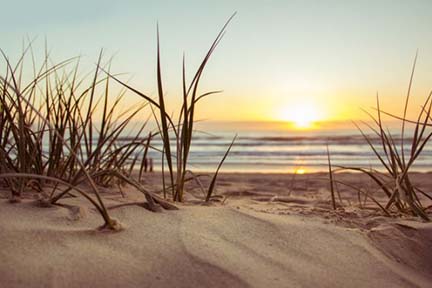June 15, 2021
Contact: Ron Olson, 517-243-1477
Great Lakes beach safety is key to great state park visits
 As the summer heats up and people begin flocking to Great Lakes beaches, the Michigan Department of Natural Resources urges everyone to keep water and pier safety in mind. As the summer heats up and people begin flocking to Great Lakes beaches, the Michigan Department of Natural Resources urges everyone to keep water and pier safety in mind.
Holding more than 20% of the world’s fresh water, the Great Lakes are large, powerful water systems. These lakes reign supreme for many during warmer months, but they also are prone to dangerous currents that can threaten even the most experienced swimmer. Adverse weather patterns can create dangerous rip and structural currents along piers and breakwalls, too. Crashing waves can create slippery surfaces and conditions strong enough to knock a person into the water.
“The DNR eagerly welcomes millions of visitors to Michigan state parks each summer,” said Sean Mulligan, Holland State Park manager. “Visitors should keep in mind that winds can come up quickly, changing conditions without warning, so always pay attention to the weather. The Great Lakes can become very dangerous, especially when waves get higher than 4 feet.” |
Unfortunately, several emergencies and drownings have occurred along the beach and breakwall areas. Many of these incidents happened during red flag days when the wind and waves are strong with greater potential for dangerous rip currents.
Of Michigan’s 100-plus state parks, 42 offer access to Great Lakes shoreline.
Ron Olson, chief of the DNR Parks and Recreation Division, said the increase in accidents and drownings on the Great Lakes in recent years is especially troubling and clear evidence that greater public awareness is needed. In particular, Grand Haven, Holland, Ludington and Mears state parks are situated in locations where rip currents tend to build and recurring safety hazards are present.
“When it comes to protecting Michigan residents and visitors on the water, especially the Great Lakes, we cannot talk enough about safety, preparation and vigilant awareness,” Olson said.
New safety measures at Holland State Park
Holland State Park, situated along Lake Michigan, is one of Michigan’s most-visited sites and provides the main access to a popular pier that is owned by the U.S. Army Corps of Engineers. More recently, the DNR and the local community have collaborated on additional ways to alert visitors to changing Great Lakes and pier conditions.
This past fall, Holland State Park staff collaborated with Park Township and The King Company to fund the installation of a gate on the pier adjacent to Holland State Park. The goal is to help save lives by restricting access during harsh weather and to reduce the number of people jumping off the pier, while still allowing people to fish from the pier when feasible. Generally speaking, the gate will be closed during the winter, when the red flags are flying and during night hours when the park is closed.
In addition, an electronic messaging board conveying beach conditions is located where visitors enter Holland State Park, and a new public address system will be used to update beachgoers as the beach warning flags are changed in response to weather conditions. Visitors also can view live beach conditions at CityOfHolland.com/645/MIHollandCAM via livestream video courtesy of the City of Holland and Biggby Coffee. Conditions are posted on the park’s Facebook page at Facebook.com/HollandStateParkMi.
River outlets and breakwalls
Dangerous currents can occur near the outlets of rivers and breakwalls, especially during times that water levels are higher.
For example, the mouth of the Big Sable River is located in Ludington State Park, but outside the designated swim area. In the past, swimmers have been swept out into Lake Michigan. This park also has installed an electronic bulletin messaging board at the entrance to the designated beach area to help alert visitors of current conditions.
In addition, swimmers should be aware of particularly dangerous structural currents that form along shoreline structures near breakwalls, such as in Mears State Park.
“When northwest winds appear, water is pushed to the shore causing dangerous currents along the north side of the pier,” said Chris Bush, lead ranger at Mears State Park. “People are often surprised that structures located in the Great Lakes can cause such powerful, and sometimes dangerous, currents.”
Using state park designated swim areas on the Great Lakes
Many, but not all, state parks on the Great Lakes offer designated swimming areas that are identified by buoys or buoys and markers, a beach flag warning system and water depth less than 5 feet at the time of installation. Water depth will be inspected approximately every 14 days and underwater obstacles will be posted or marked. You may also find other designated swim areas in areas other than state parks.
Check the flag upon arrival and be sure to monitor it throughout the day because conditions can change rapidly.
- Green flag = Go. Enter the water but stay aware of changing conditions.
- Yellow flag = Caution. Watch for dangerous currents and high waves.
- Red flag = Stop. Stay on the beach; do not enter the water and do not swim.
There are no beach guards at state parks , so please never swim alone and keep close watch of children. Stay within arm’s reach and make sure all kids wear life jackets.
If there is an emergency, immediately call 911. At Holland and Grand Haven state parks, use the nearest red zone number boards (located on the beach) to help relay your location as accurately as possible.
State park designated swim areas have lifesaving flotation device and equipment. Remember the safety equipment on the beach or pier is for emergency use only; using this equipment for anything else is against the law.
Keep these additional cautions in mind when enjoying time in and around the Great Lakes:
- Currents near piers can be extremely hazardous. Pay attention to the buoys marking the designated swim areas; swimming outside of the marked swim zones can be dangerous and should be avoided.
- During certain weather conditions, the force of water and waves crashing over the surface can easily wash someone off a structure; always monitor the beach flag warning system.
- Before leaving home, learn about the types of Great Lakes currents and how to escape them.
- Check local weather reports and lake conditions before and during your beach trip.
Nondesignated swim areas on the Great Lakes
Visitors in areas without designated swim beaches should use extreme caution because they will not have the benefit of the beach flag warning system or the visual cautions of buoys that mark water depth and other obstacles.
More smart safety water tips
When swimming or boating in any body of water – whether the Great Lakes, inland lakes or slow-moving rivers and streams – make safety your first priority. Never swim alone, always keep close watch of children and bring U.S. Coast-Guard-approved life jackets, especially for new and inexperienced swimmers.
When boating, have life jackets available for everyone on the vessel, leave a float plan with someone on shore, stay alert and carry a cell phone or marine radio. Such planning goes for those on personal watercraft like Jet Skis and paddle boards, too. Learn boating safety.
More info
Visit Michigan.gov/BeachSafety to learn about the beach flag warning system, how to escape rip currents and more.
For more on overall beach and water safety at state parks throughout Michigan, contact Ron Olson at 517-243-1477 or [email protected]. For more information on Holland State Park, contact Sean Mulligan at 616-399-9390 or [email protected].
Note to editors: Accompanying photos are available below for download.
|




 As the summer heats up and people begin flocking to Great Lakes beaches, the Michigan Department of Natural Resources urges everyone to keep water and pier safety in mind.
As the summer heats up and people begin flocking to Great Lakes beaches, the Michigan Department of Natural Resources urges everyone to keep water and pier safety in mind.


